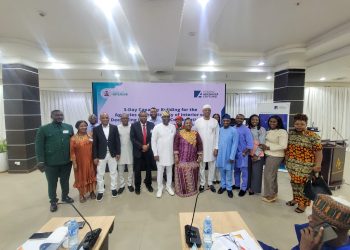By Nkechi Eze
In a decisive move to overhaul and modernise Nigeria’s telecommunications regulatory framework, the Nigerian Communications Commission (NCC) has unveiled its first-ever Regulatory Impact Assessment (RIA), a landmark initiative that promises to recalibrate industry rules in line with modern technological realities, market evolution, and consumer demands.
The historic event, held on Wednesday, June 26, 2025, at the Commission’s headquarters in Abuja, drew a diverse and influential gathering of stakeholders, including representatives from telecom operators, industry analysts, consumer rights groups, legal experts, and key officials from various government agencies. The unveiling of the RIA marks a pivotal chapter in the Commission’s broader strategy to promote an adaptive, responsive, and evidence-based regulatory regime capable of supporting Nigeria’s fast-growing digital economy.
In his welcome address, the Executive Vice Chairman (EVC) and Chief Executive Officer of the NCC, Dr. Aminu Maida, described the Regulatory Impact Assessment as a strategic tool for ensuring that existing and future telecom regulations are both effective and adaptable. He noted that the Commission was deliberately rethinking its approach to governance by leveraging impact assessments to drive regulatory decisions.
“This engagement allows us to recalibrate our regulatory approach,” Dr. Maida said. “The RIA ensures our rules are not only effective but also adaptable promoting innovation and investment while protecting public interest. It supports our key strategic pillars of consumer protection, market efficiency, and national development.”
Dr. Maida explained that the assessment had been meticulously designed to evaluate the influence of regulatory policies on key aspects such as consumer satisfaction, access to market, fair competition, innovation, and alignment with national economic goals. He said the RIA would serve as a blueprint for refining the existing telecom regulations to better reflect contemporary market needs and technological developments.
Delivering the opening remarks at the event, the Head of Legal and Regulatory Services at the NCC, Mrs. Chizua Whyte, characterised the RIA as a “transformational milestone” and a critical turning point in how the Commission approaches rule-making. She described it as an “evolutionary shift” from reactive to proactive governance, adding that regulatory decisions should no longer be made in a vacuum but rather based on measurable data, market realities, and stakeholder feedback.
“Our goal is to simplify procedures, clarify obligations, and eliminate outdated rules that could hinder innovation or deter investment,” Mrs. Whyte noted. “This is about aligning regulation with dynamism. The RIA helps us embrace change, anticipate challenges, and create a fair and enabling environment for all players.”
According to her, the RIA focused on eight critical areas within the Commission’s subsidiary legislations, including licensing procedures, SIM registration guidelines, subscriber data management, spectrum trading, regulatory enforcement mechanisms, and infrastructure sharing. These areas, she noted, have far-reaching implications for both operators and consumers and therefore needed thorough evaluation and recalibration.
She lauded the Commission’s decision to incorporate both internal analysis and external consultations in conducting the RIA, describing the collaborative model as a gold standard for future regulatory interventions. “What we have here is not just an internal document, it is the result of extensive engagements with stakeholders who will be directly impacted by these regulations. This is what responsible and inclusive regulation should look like,” she said.
The event featured an interactive session during which stakeholders engaged deeply with the Commission’s legal and technical teams on the methodology, findings, and implications of the RIA. Discussions centered around the necessity for ongoing review of regulatory instruments, the balance between enforcement and innovation, and the importance of creating a level playing field for emerging market entrants.
Participants commended the NCC for its boldness in embracing reform and evidence-based policymaking, especially at a time when rapid technological advances such as 5G, artificial intelligence, and data-driven services are reshaping global telecommunications ecosystems.
A recurring theme throughout the forum was the importance of forward-looking regulation in driving investment, safeguarding consumer rights, and enabling Nigeria to fully harness its digital potential. Stakeholders expressed optimism that the revised regulations inspired by the RIA will boost investor confidence, eliminate bottlenecks for smaller operators, and enhance service delivery across the board.
In closing, the NCC reaffirmed its commitment to creating a transparent, inclusive, and dynamic regulatory environment that meets the needs of an evolving sector. The Commission emphasized that the RIA is not a one-off exercise but part of a long-term commitment to continuous improvement, iterative learning, and responsiveness to stakeholder needs.
“This is the beginning of a new regulatory culture,” Dr. Maida concluded. “Our goal is simple: to ensure Nigeria’s telecom regulations empower, not impede; foster innovation, not stagnation; and ultimately serve the interests of the Nigerian people and economy.”
With the unveiling of the RIA, the NCC has signaled its readiness to be not just a regulator but a facilitator of growth in an era defined by digital disruption and global competitiveness.

















